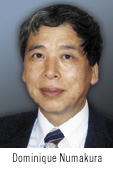
The biggest PCB show continues to amaze.
The Japan Printed Circuit Association (JPCA) Show 2006, the world's largest PCB industry exhibition, was held on May 31 at the Tokyo International Exhibition Center, also known as the Tokyo Big Sight.
About 600 companies and organizations exhibited, occupying about the same amount of floor space as in 2005. Still, several major Japanese companies had to give up their booths due to the limited space. Many foreign companies were represented, including PCB companies from Europe and the U.S.
Although I did not see the official attendance numbers, there were many attendees from Japan as well as from other countries during the three-day exhibition. There were usually seats available in the VIP rooms and cafeterias in the mornings, but it was difficult to find a seat anywhere in the afternoons. Traveling from booth to booth was difficult during the afternoon of the last day because of the large crowds. I believe a new attendance record could have been reached this year. Attendees observed that the PCB business in Japan is still weak but rebounding, which could have contributed to the increase in visitors this year.
I noticed many visitors from Korea, Taiwan, China and other Asian countries, but I did not see many Americans or Europeans other than exhibitors. The Asian attendees seemed primarily interested in finding new technologies and products, as well as contacting candidates for engineering positions in Japan. Negotiations were tough and serious during the show, and there was a noticeable imbalance between supply and demand. Representatives from Chinese companies were looking for specialists in the PCB manufacturing and engineering fields.
A unique aspect of the show this year was the addition of open seminars. Industry specialists geared their speeches towards topics critical to PCB technologies. There were 100 chairs arranged for seating in each seminar, but many visitors were still forced to stand. I did not hear any innovative new technologies discussed this year, but there were a lot of small advances in all areas. Several topics were discussed during the show, but the major talks included new technologies for flexible circuits and ultra high-density technology. Some companies exhibited fine traces. Material suppliers were interested in lead-free and halogen-free areas, while LDI was the predominant topic of discussion for the equipment vendors.
Headlines
Hitachi Global Storage, a major disc drive manufacturer, will commercialize 2.5õ and 1.8õ drives with vertical recording systems in the second half of 2006. The new system reduces rotating speed and power consumption significantly.
Techno System, a market research firm in Japan, reported that global shipment of flat panel TVs increased to 30.5 million units in 2005. Samsung had first place for LCD TV in Q1 2006, while Panasonic had the first slot in the PDP TV category.
Canon plans to double its production of digital camera printers for home use, to 2 million units in 2006.
Okamoto Glass, a glass material supplier in Japan, has developed a new glass plate that changes UV lights into visible lights for LED and UV laser devices.
Mitsui Metal Smelting, a major copper foil supplier, has commercialized a low-profile ED copper foil DFF for COF applications. The new foil has high bond strength with polyimide resin for high flexing endurance.
Sato Light Kogyo, a material supplier in Japan, has developed a new anti-static material with PEEK resin and carbon nanofibers.
Citizen Electronics, a major component supplier in Japan, has developed a new SMT condenser microphone for high temperature reflow lines.
Panasonic Electronic Device and Yamanashi Matsushita will merge October 1, 2006. The name of the new company will be Panasonic Electronic Device Yamanashi.
TDK, a major component supplier in Japan, has developed a chip coil, the MLG0402 Series (0.4 mm x 0.2 mm). Volume production will begin in July.
Nikko Metals, a major copper material supplier in Japan, will increase the production capacity of RA copper foil for flex circuit applications 20% to 7.2 million square meters per month.
Toyobo, a major material supplier in Japan, has developed a new heat-resistant thermoplastic elastic resin for automobile applications. The new resin is available up to 175ºC for permanent use.
Alps Electric, a major device manufacturer in Japan, has developed a new copper wiring technology by using electroless plating on glass substrates. The technology is available for flexible circuits as well. The company has also developed a new through-hole technology on thin glass substrates for the wafer level packaging of MEMS devices.
Fuji Film has completed the construction of its new manufacturing plant in Suzhou, China. The new plant produces broad product lines for IC packaging and LCD panels. PCD&M
Dominique Numakura is president of DKN Research; This email address is being protected from spambots. You need JavaScript enabled to view it..












